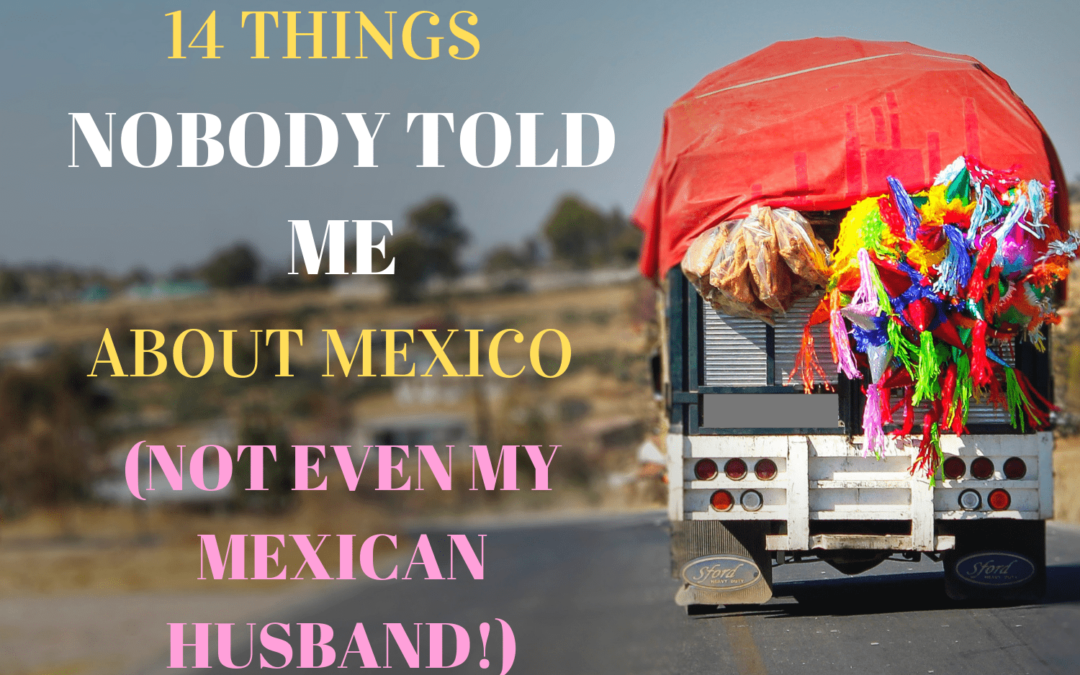When our little family moved to Mexico I had been married to my Mexican husband for 4.5 years. I had also been in a Spanish-speaking religious organization for 11 years; therefore, easily half of my friends were Mexican. Furthermore, I had been working as a Spanish medical interpreter for 5 years, daily engaging with people from a wide variety of Latin American countries, but the majority from Mexico.
So I was already fond of the idea of putting spicy chile on everything, including fruit and candy, and I was aware that tortillas were not just for burritos.
But even with all of that background, I must admit, I was met with so many surprises when actually moving to Mexico. Keep in mind that up to this point, with the exception of a half-day outing to Cozumel during a cruise, I had NEVER been to Mexico or even outside of the U.S. at all!
From the silly to the significant, I began discovering new things all the time.
Here are 14 things that nobody told me about Mexico (not even my Mexican husband!)
1. Don’t flush the toilet paper
So….we were had just recently moved to Mexico and were in our first apartment in Cabo San Lucas (go Cabo!!). I immediately had a problem. The toilet was clogged. I’d been in Mexico for about 2.5 hours and purchasing a plunger hadn’t been the first thing on my to-do list. My husband had already arrived 2 weeks earlier to pave the way for us, but, unfortunately, he hadn’t bought one either.
I informed him of the situation and he proceeded to shock me with his response.
“Oh, you flushed the paper didn’t you?”
“Uh…no, I don’t feel like I put too much paper in there before flushing.”
“But I mean you flushed some paper?”
“Well, of course I flushed the paper! What are you talking about??” (Sorry, but I had just traveled for the FIRST time ALONE with a 10-month old on a 2-legged international flight. I was not in the mood for silly questions such as if I had flushed toilet paper.
Well, at this point, my husband proceeded to explain that paper should be thrown in the bin, not in the toilet. The plumbing in much of Mexico is older.
To my surprise, over time I came to realized that this was the case even in a lot of newly constructed facilities and houses. There are exceptions, such as a lot of airports and hotels.
But, in my experience, more often than not, the TP goes into the bin. Yeah…moving on…
2. What a tinaco and cisterna are and why you should care if you would like to continue bathing

I think it was about Day 4 of our move to Mexico. We hadn’t purchased any appliances yet (and FYI they usually don’t come with rentals in Mexico unless you get a place that’s furnished).
So I was happily cooking away on my tiny 2-burner plug-in-the-wall electric stove and went to wash my hands. I turned on the faucet and….nothing.
“What happened to the water?” I asked my husband.
“Oooh,” he replied. “Maybe it ran out.”
“What are you talking about? Like the city is out of water or something?”
“No, I think ours ran out. Let me go check.”
I waited….
“Yup, we’re going to have to buy some until it comes again.”
“Huh????!”
Well that day I learned that water is stored in tinacos (water tanks often seen on the tops of roofs) or cisternas (underground tanks), that are connected to a pump and bring the water to your faucet. So when yours runs out, it’s gone. How often those tanks get autofilled depends on where you live.
The first neighborhood where we lived in Cabo San Lucas for a few months had one medium-sized cisterna which was shared with the neighbor and a water arrival schedule of about once per week. Not the greatest situation.
We later moved to a house with a cisterna and two tinacos on the roof and a water arrival schedule in that neighborhood of about twice per week. We never had a problem again.
3. The most economical way to obtain drinking water

Well, I’m sure you heard that you should not drink tap water, and it’s true.
Well, we seriously spent our
Then we discovered
Here in Chiapas, we call up a company, a guy comes and gets ours, takes them to clean them, refills them, and brings them back for 10 pesos (about $0.50 USD). That is the life right there.
4. You’ll probably be using portable gas tanks to cook
I had never seen one of these little things before, but now I have GasCom company on speed dial and I order one every month. These little propane gas tanks physically connect to your stove, water heater, dryer, etc….
I’ve heard that there are metropolitan areas (such as parts of Mexico City) that have an underground/utility gas system like what we’re accustomed to in the U.S., but I have yet to experience that.
5. Every day sounds like Independence Day.
So back in my old Kentucky home, I recall there being fireworks twice per year – New Years and 4th of July. Here (and especially here in San Cristobal de las Casas) people are setting off fireworks and firecrackers multiple times per month.
It used to disturb my sanity and my sleep, but now it’s become part of Mexico’s background noise to which I’ve become so accustomed. Why so many fireworks? Move on to #6.
6. There are waaay more official holidays here than in the U.S.
There’s a Day of the Virgen Guadalupe, Day of the Mexican Constitution, (not to be confused with Mexican Independence Day or Day of the Mexican Revolution), Day of the Dead, etc…etc…
Businesses will close. Schools with close. These events are often loudly celebrated in the streets and in people’s homes and those celebrations include…you guessed it…fireworks!
7. The street vendors

“El gaaaaaas!!!!!” “Agua Ciel!!!!!” “Venimos ofreciendo nances curtidos!!!!” “El paaaaaan!!!”
If you need a new gas tank, the water in your
But be warned: After having moved to Mexico, the reverse culture shock of the super quiet streets when you go back to the U.S. is a bit unnerving.
8. International mail through the regular post office service may never arrive
So I kind of figured this one out a couple weeks prior to moving to Mexico when I attempted to send my husband his birth certificate. Manilla envelope in hand, prepared with a big long address, I went to my local post office and dropped it off. It never arrived…like ever.
My parents sent me a small box of cosmetics through the post office that was supposed to be guaranteed with a tracking number. It never arrived and no one could find it. Or so I thought! It actually did arrive approximately 4 months later. That was a pleasant surprise!
Just the other day, the local post office (Correos de Mexico) called me to tell me that a package was being sent back because they’d had it for a month and I hadn’t been home to receive it, or responded to the notifications on my door. (FYI, they will not leave things on your porch here).
I indignantly stated that I am home every day and I had not received a single notification. I asked them to hold on to it and my husband had to race over there to rescue it for me. Ugh.
But it is hit or miss. Once, my friend informed me that she’d sent me a gift in the mail a couple of weeks prior. Uh-oh. My heart sank when she told me she’d sent it via regular mail. I hadn’t had a chance to warn her about the postal system.
Amazingly, while I was still on the phone with her, my doorbell rang at that moment and there was her gift. Whew! Correos de Mexico came through for me that time!
There are some online companies that have no other international shipping option except international priority mail. In my experience, those packages will arrive eventually but don’t assume that it will be 7-10 days, as they state. It may be, but I tend to order things a month before I need them.
Oddly enough, things have arrived to me faster here in the southern state of Chiapas than when I was Cabo San Lucas. I have yet to determine why.
Bottom line. Use DHL, FedEx, or UPS for your packages whenever possible. DHL is my fav and the fastest in my area. Estafeta is also good for national shipments. Just don’t trust the actual post office in either country to deliver international packages.
P.S. I’ve had great success with Amazon because they usually ship DHL. Everything arrives pretty fast, without the need for an Amazon Mexico Prime membership (which is a thing, by the way).
9. You should tip the bagger at your grocery store (and a lot of other people!)
The baggers at grocery stores are often volunteers. And even when they aren’t, it’s customary to tip them a few pesos.
You will also notice that everywhere you turn around, someone will try to do something to earn a few pesos.
There are always people in the shopping area parking lots to help wave you into a parking spot or help you back out of one. They will put flattened cardboard boxes on your windows to shield your car from the sun.
Someone will offer to put your groceries in the car. They will startle you and jump onto your car while you are at a stoplight and proceed to wash the windows.
Although it can become comical when you really didn’t need assistance, I totally respect hustle. I much prefer to give a few pesos to someone who attempted to help me out than to someone who is simply begging in the streets.
10. Gasoline, electronics, and well-known branded items are more expensive here
As you would likely expect, you will pay WAY less than in the U.S. for most items such as rent, utilities, and any service. However, expect to pay more for gasoline, electronics, and some manufactured goods, such as well-known branded items, baby supplies, etc…
We tend to purchase our cell phones, tablets, and computers from the U.S. and bring them with us or have my mom and dad bring them when they visit. As long as it’s just a few items for personal use and not so much that it looks like you’re planning on re-selling, you won’t have any trouble with customs at the airport.
11. A DRAMATIC gap in the way of life

Regular folk that we are we did not go live in a ritzy touristy area of Los Cabos when we moved to Mexico. However, it still surprised me that only a few blocks away from our regular “middle class” neighborhood there were literally houses made out of
Then, not too far from there, you have well…Walmart, Sams, downtown filled with tourists, nice restaurants, beautiful, clean beaches, nice houses (of locals, not tourists).
In any typical day that took us from our ministry work to getting groceries to having dinner out, we could be in all of those areas in one day. It became routine, but at first, these stark differences were unlike anything I’d witnessed before.
12. You will see children working in the streets
Seeing tiny kids in the streets (often with no parents in sight) selling random items or simply asking for money pulls at my heartstrings, but it is
Once, a little girl who could not have been older than 3 (but she was accompanied by her mother), walked through traffic on a 4-lane highway to hold out her hand for a peso.
However, she was distracted by the hamburger that my husband was eating and began to whine and desperately point to it. Of course, he gave it to her. And I spent a good portion of that day crying and depressed over the sad situation.
13. You can block off the roads when you want and there’s nothing anybody can do to stop you

People like to go on strike – from teachers for higher pay to local citizens when the gas prices get too high.
But a strike here does not mean a crowd gathered in a public area with posters and chants. It means blocking the roads (yes, the same ones that you need to get to work or the airport) in a very useful attempt to get your attention.
The authorities may eventually get involved, but their power may be limited. Your everyday cop doesn’t walk around armed like they do in the U.S. Sometimes stronger authorities are called in or sometimes the situation is left until it dies down.
This will definitely vary depending on your region. I didn’t notice it happening in Los Cabos, but it happens relatively frequently in Chiapas. Sometimes you can take a detour or sometimes you just have to change your plans.
When my parents visited we barely got them back to the airport on time before the roads were blocked…Whew!
14. People take their title very seriously
In the U.S., it’s typical to call someone who is a doctor, or perhaps a professor, by that title even when he or she is outside of the workplace. But here people are proud of their titles…any title that they possess.
So you will likely here people being called ingeniero (
Status is important. Sometimes status matters more than money. I noticed this, for example, when we went to apply for seguro popular. This is basically a public health insurance system, free to some and paid by others. The amount you pay depends on your family situation.
I went with proof of income in hand (well, in purse) as I was certain I’d be asked for it. Nope. They simply asked what we did for a living. We responded truthfully, and I guess since nobody said doctor, lawyer, or engineer we got our health insurance for free.
We waited until we got back to the car to do our happy dance.

Truly, spending time in another country will open your eyes to a brand-new experience and force you to think about the things that you used to take for granted.
There is so much more I could mention and I’m sure the list will only grow as time goes on. Be on the lookout for part 2.
Don’t miss 10 things I ADORE about living abroad in Mexico!
Comment below to let me know which of these items surprised you the most!
What about you? What surprised or shocked you when you moved to Mexico or another country?
Like this? PIN IT! 🙂

Erica Ray
Latest posts by Erica Ray (see all)
- The Spanish Imperfect Tense (essential for good storytelling!) - February 10, 2025
- Real Spanish Conversation: El Trabajo (Spanish Listening Practice for Intermediate/Advanced) - January 14, 2025
- Por vs Para: The SIMPLEST way to understand and choose between them - January 14, 2025


I could probably add a few things to this list, after 15 years in Mexico! It’s all very true, although sometimes things vary a lot depending on where you are.
Very true! 🙂
The toilet paper thing really surprised me! So, what happens when the bin has used paper in it? Do you have to take out the trash every time someone uses the toilet? That must be really smelly.
If you’re in your own house you can take the trash out each time. In other places, you don’t have much of a choice, unfortunately.
Loved this Erica! All of it was so interesting. I found the roads blocked off interesting….I’d be so anxious if I had to get somewhere. Also the towns where you’ll find cardboard homes & then fancy hotels on the other side of town interesting. Thanks! Love reading all this❤️
Thank you so much! Yes, the road blocking is anxiety-inducing indeed! Fortunately, it’s been a minute since this has happened. We’re just waiting on the next incident. 🙂
I love this website. You’re such a good writer and everything is so interesting! I’ve already learned so much. I read everything the first day you launched it 😂 can’t wait for more!!!
Thank you so much!! 😀